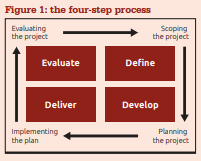In CPD
Bookmark
After reading this module, you will be able to:
- Understand how project management helps to embed new processes in the pharmacy
- Break down a project into steps and processes that help you reach your ultimate goal, managing four distinct stages through to completion
- Work with your team to generate ideas and assign individual tasks to the most appropriate individuals
- Utilise simple tools, including fishbone (Ishikawa) diagrams and Gantt charts, to scope and manage a project.
Some business theorists are guilty of over-complicating project management – but at its core, it involves simple principles and the common-sense application of tools and processes that will help you to introduce and manage changes effectively.
Across the UK, community pharmacies have adapted to huge changes in patient flows as new services direct people to the pharmacy from other providers like general practice, or sometimes through patient self-referrals. On top of this, digital pathways are increasingly the norm, whether it’s those referrals or patients booking clinical services online,
This is all part of the sector’s evolution, and much of it is – or will be once it’s had a chance to properly embed – to the good for both teams and patients. But implementing change on this scale is a very tall order. Pharmacists and managers will need to call on project management skills and tools to scale these challenges.
Project management is mainly concerned with planning and managing change – whether that is implementing a new service or an appraisal system, reviewing the pharmacy’s approach to OTC merchandise or looking at new ways to deploy staff. Any change comes with some degree of risk, but careful planning and clear communication will boost the chances of success considerably.
Given the launch of Pharmacy First, the way businesses in England run may well look different this year to last year; it will almost certainly look quite different to before the pandemic. These changes can seem considerable tasks when looked at in the round, so it is helpful to instead view them as a series of projects, or tasks you wish to achieve.
A definition might help: a project is the work that needs to be done to produce a unique, predefined outcome within a predetermined period of time and budget. These projects come in all shapes and sizes, from small-scale quick wins to the large and highly complex.
What distinguishes a project from ongoing work is its one-of-a-kind nature.
Getting everyone to spend an afternoon pitching in to tidy the dispensary is a project; keeping it tidy is business as usual.
There are four distinct stages to successfully managing a project (Figure 1). In summary, they are:
- Define Decide on the scope of the project: What are your objectives and desired outcomes?
- Develop What options are available? How much time (and other resources) will the project take up? This stage is about formulating a clear plan
- Deliver Implement your plans with enthusiasm and energy
- Evaluate Monitor progress to measure success and adjust as necessary.



